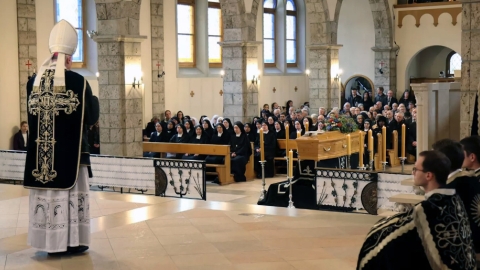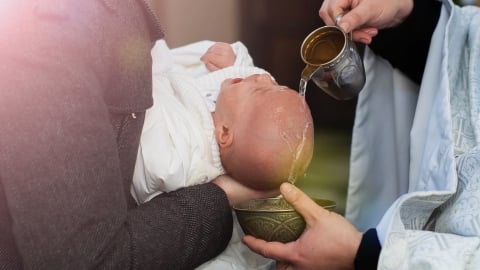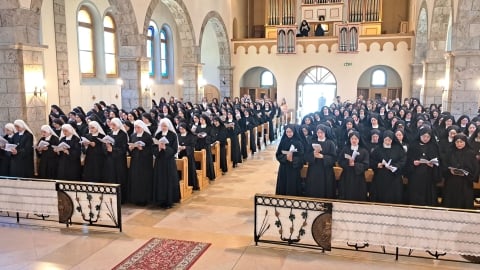Sisters of the Poor: Politics or Theology?

Reflections about the Little Sisters of the Poor and their battle against a federal mandate requiring them to provide contraceptives and abortion-inducing drugs to employees through their health-care plan.
In his day, the famous 19th century French revolutionary, Pierre-Joseph Proudhon, was forced to admit a timeless lesson: “It is surprising to observe how constantly we find all our political questions complicated with theological questions.” Proudhon’s confession inspired his contemporary, the great Spanish anti-liberal defender of Catholic tradition, Juan Donoso Cortes, to respond with the equally timeless explanation: “There is nothing in this to cause surprise, except it be the surprise of Mr. Proudhon. Theology, being the science of God, is the ocean which contains and embraces all the sciences, as God is the ocean in which all things are contained.” (See Cortes, Catholicism, Liberalism, & Socialism, Preserving Christian Publications)
It is important to remember these truths as faithful Catholics brace themselves for the latest legal drama at the U.S. Supreme Court, this one involving the Little Sisters of the Poor and their battle against a federal mandate requiring them to provide contraceptives and abortion-inducing drugs to employees through their health-care plan. The case began in September of 2013 at the federal district court in Denver, Colorado where the Sisters asked for temporary relief from the government’s “contraception mandate” under the Affordable Care Act (what has become known as “Obamacare”). After defeats at both the District Court and the Tenth Circuit Court, the Sisters filed a petition with the Supreme Court. The Court agreed to hear the case along with the petitions of six other non-profit religious ministries in what is now referred to as Zubik v. Burwell. Timelines and documents of all six cases can be reviewed at the SCOTUSblog.
The Back Story:
The Little Sisters of the Poor describe themselves in the original petition as “a Congregation of Catholic Sisters who operate homes for the elderly poor of every race and religion” that are “guided by and operate in accordance with Catholic teachings”. The petition states that the religious beliefs of the Sisters “forbid them from participating in the government’s scheme to provide contraceptives, sterilizations, and abortion-inducing drugs” and that the government’s refusal to grant an exemption have left them with a stark choice: “either abandon their Catholic beliefs and participate in the Final Mandate, or they will be punished by the government with an array of fines and penalties unless and until they comply.” According to lawyers from The Beckett Fund who are representing the Sisters, they could be forced to pay $70 million in fines per year, which is about one-third of their total operating budget.
Knowing that most political questions are ultimately about theology, faithful Catholics should note three essential features of this case that might escape the casual observer. First, the Sisters are not challenging a law enacted by Congress, but a mandate issued through a regulatory rule-making process. When Congress passed Obamacare, it intentionally included vague directives that the Department of Health and Human Services (HHS) would later interpret and expand through the rule-making process. Obamacare requires employers to “provide coverage” for “preventive services” for women (including “preventive care”), but the statute itself did not contain what has become known as the “contraception mandate” that the Sisters are challenging. The Obama Administration employed a tactic that should be familiar to Catholics: making use of deliberately vague language in order not to arouse an opposition that would threaten passage, but which cleverly paves the way for an open and lethal “regulatory” (i.e., pastoral) implementation.
Why Not Argue the Case Using the First Ammendment?
The second essential feature of this case concerns the Sisters’ decision to argue under the Religious Freedom Restoration Act (RFRA), and not the First Amendment. The RFRA is a federal statute signed into law by President (Bill) Clinton after the Supreme Court struck down the traditional legal test for protecting “religious liberty” under the First Amendment. Thus, it was an attempt by Congress to overrule the Supreme Court. The RFRA requires the federal government to prove that a contested law which substantially burdens the free exercise of religion represents the “least restrictive means” of advancing a “compelling government interest.” The Sisters already lost this argument at the Circuit Court. A loss at the Supreme Court could end up gutting the statute that was meant to overcome the gutting of the First Amendment. The defenders of “religious liberty” assured Catholics that the Faith would have equal rights under the law. Forewarned is forearmed!
Finally, the third essential feature of this case (and perhaps the most telling) is the fact that HHS has already exempted certain employers from the contraception mandate. The regulatory ruling grandfathered existing plans that did not cover contraceptives, exempted small firms, and exempted “religious employers”. These exempt groups combine to include tens of millions of employees. Why is this significant? For one, it means the Obama Administration has expended significant time and resources to deny the Sisters and exemption that has already been granted to such corporate giants as Exxon, Chevron, Pepsi, and even its own U.S. military. As the Sisters have argued, “1 in 3 Americans do not have a plan that is subject to the mandate HHS is fighting so hard to force the Little Sisters to follow.” It is not difficult to conclude that this battle is not over the exemption (a practical matter), nor the exempt (a political matter), but the rationale (a theological matter).
Another reason these embedded exemptions are significant is the fact that HHS defined the term “religious employers” so narrowly that it applies primarily to churches and synagogues but not to religious schools, hospitals, or charities. This must have inspired the Sisters to publish a humorous cartoon depicting an HHS agent explaining: “Look Sisters, I’m not sure you’re really the best qualified to decide what a valid religious concern is.” In response to the public outcry over its too narrow definition, HHS gave religious employers an “accommodation” that allows them to comply with the mandate by informing HHS of their objections, but which simply results in HHS notifying the insurer that it is required to provide contraceptive coverage at no charge. In other words, the cause and effect of distributing contraceptives do not change, only the source of direct payments to cover the cost of distribution. The Sisters objected to this by arguing that it still requires them to participate in the process of providing contraceptives, even if that does not include payment. Indeed, this last statement of principle should give hope to all faithful Catholics. However, both the Court and the Sisters have indicated where this is likely headed.
A Compromise - But only in Spirit?
In a surprise move after hearing the case on March 23, the Court asked both sides to provide additional arguments about whether the government could find ways to distribute contraceptives without the involvement of religious non-profits and their health plans. The government has already argued that “contraceptive-only” plans are unworkable, but the Sisters have stated that accepting such plans was “an easy and obvious answer” for them. In fact, they posted the following statement on their website: “The Little Sisters of the Poor have never sought to prevent the government from providing these services, but have simply asked that the government pick a way that doesn't force them to deliver services—like the week-after pill—that violate their faith.” Surely this is a statement of principle that the secular state can live with for now.
We should pray that the Sisters win, but it appears that God loses either way.
It should come as no surprise that we continually arrive at a point where courts decide what the Catholic conscience is allowed to tolerate. With remarkable consistency and clarity, the 19th century Popes condemned the errors they predicted would lead to these times.1 A Catholic mind instinctively knows the lesson admitted by Proudhon and explained by Donoso Cortes above: our political questions are always and essentially theological questions. The secular (godless) State is its own religion that enforces its own theology. The great program of “religious liberty” protects the government’s right to provide its godless services, but it cannot protect the unborn baby, preserve the sanctity of marriage, nor safeguard against activity prohibited by sincerely held religious belief. In another great modern inversion of the natural (and supernatural) order, the state uses “religious liberty” to cast the Church as the woman of Canaan, who was grateful to beg for crumbs that fall from the table of her master.
- 1Among the many possible citations, Pope Leo XIII wrote: “Justice therefore forbids, and reason itself forbids, the State to be godless.” The Holy Father then extended the principle (and predicted our times) by adding that justice also forbids the State “to adopt a line of action which would lead to godlessness – namely to treat the various religions (as they call them) alike, and to bestow upon them promiscuously equal rights and privileges.” (Libertas Praestantissimum)





